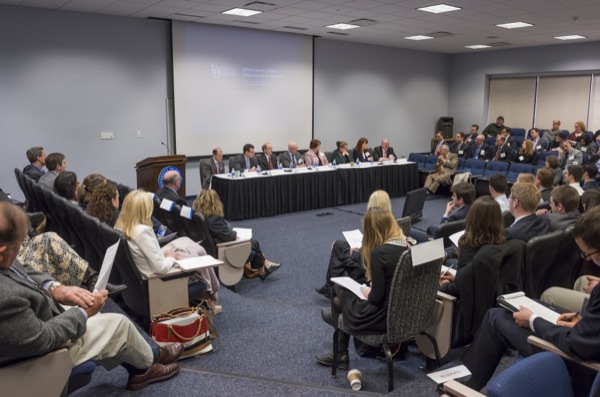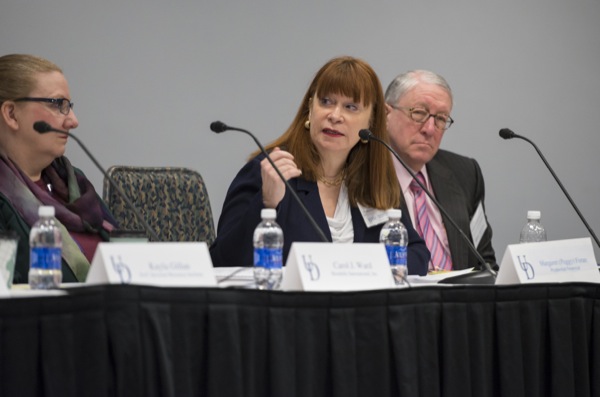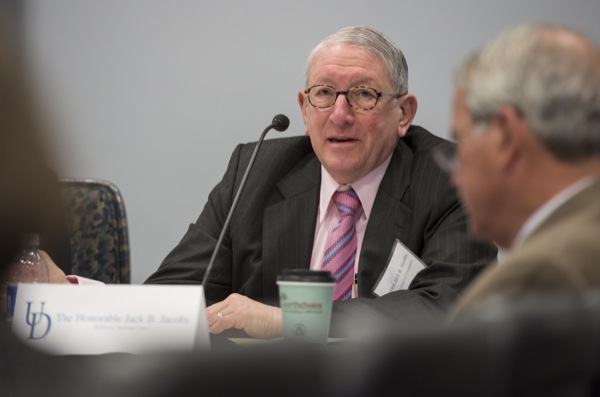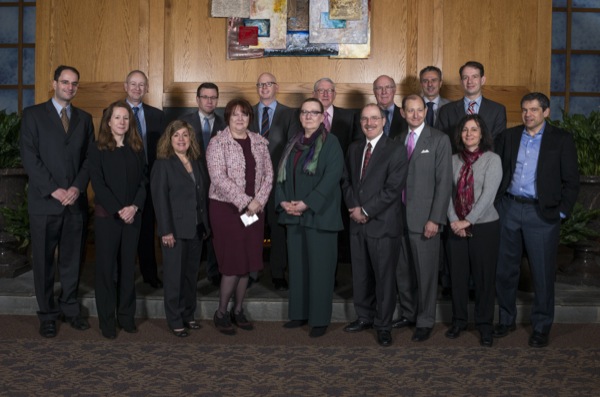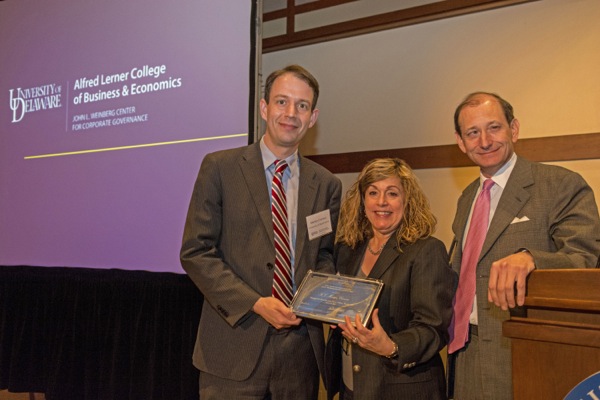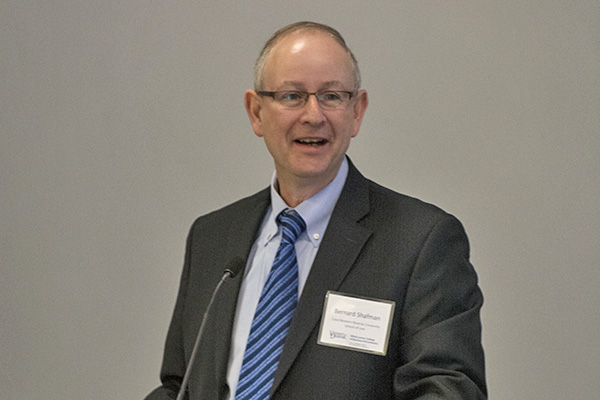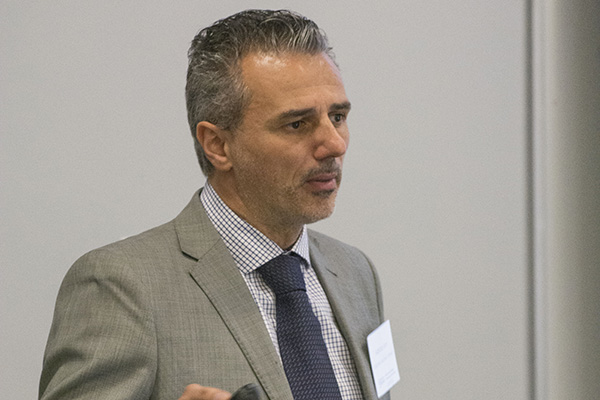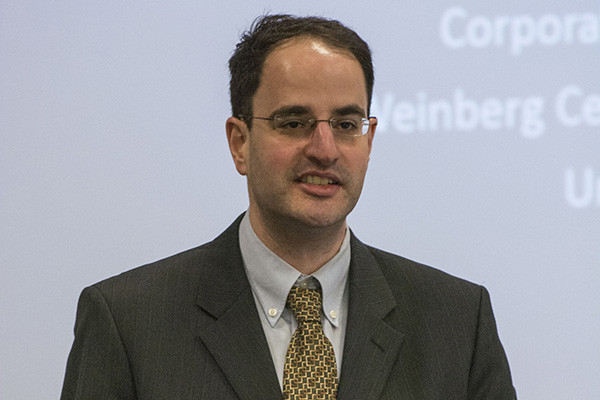Governance matters
Weinberg Center symposium addresses hot topics in corporate governance
10:23 a.m., March 27, 2014--The University of Delaware’s John L. Weinberg Center for Corporate Governance hosted a symposium on “Governance Issues of Critical Importance to Institutional Investors,” which included a panel discussion followed by the presentation of four academic papers, to a sold-out crowd on Wednesday, March 19, on UD’s Newark campus.
From institutional shareholders, proxy advisory firm representatives, corporate secretaries and a member of the Delaware judiciary on the panel, to practitioners, academics and students in the audience, the mix of various constituencies in the room to interact, learn and teach is what the center’s mission is all about, said Charles Elson and Ann Mulé, director and associate director of the Weinberg Center.
Campus Stories
From graduates, faculty
Doctoral hooding
“This symposium gives us an opportunity to highlight the very important research we do at UD as well as focus on academic work throughout the world, serving as a bridge between academics and practitioners,” said Mulé, who is also former chief governance and compliance officer, assistant general counsel and corporate secretary for Sunoco Inc.
According to Elson, Edgar S. Woolard, Jr., Chair in Corporate Governance and moderator of the panel, the symposium covered “governance issues of critical importance to institutional investors in an effort to have a positive impact on the field of corporate governance.”
Panelists included: Glenn Booraem, principal, Vanguard Group Inc., and controller of each of the Vanguard Funds; Margaret (Peggy) Foran, chief governance officer, vice president and secretary of Prudential Financial Inc.; Kayla J. Gillan, principal, PwC; Jack B. Jacobs, Delaware Supreme Court justice; Robert McCormick, of Glass Lewis; Patrick S. McGurn, executive director and special counsel, Institutional Shareholder Services; and Carol J. Ward, vice president and corporate secretary of Mondelēz International (formerly Kraft Foods).
So what are some of 2014’s hottest topics? Board refreshment, composition, skills and diversity, to name a few.
Some panelists suggested board refreshment is a big theme today in the context of concern that longevity can impair independence; it is also needed to bring important expertise and skill sets onto the board.
As for diversity on a board, one panelist suggested that an array of perspectives and different backgrounds can help drive good decision-making, while another emphasized board diversity reaches beyond gender, extending to other forms.
“For many, we talk about gender diversity on boards but there is actually a much broader evaluation,” said the panelist. “There are age, experience, skill sets, geographic background. All these things come into play.”
One panelist referred to the recent article published by Mulé and Elson in Directors & Boards, “A New Kind of Captured Board,” in stating that investors are pushing for industry experience on boards; another panelist said that what is really important is who is on the board – even if the right board structure is in place.
“There’s a difference between attributes and statistics as you look at competencies,” said another panelist. “There are very few local companies now. Most are multinational, including in the areas of sourcing, selling and buying outside the U.S. It can be advantageous if directors include people who have cultural literacy, including in terms of strategy and selecting management, to improve leadership and decision-making and the complexities of operating a large global company.”
“Establishing a learning culture is important,” added the panelist. “The board should be able to adapt to changes.”
Asked another panelist regarding the importance of board tenure, “How far are the directors from skill sets and experience? How relevant is the knowledge and skill set? Are they out of touch?” The panelist noted that one company had a tenure rule that related to the number of years away from active employment rather than an arbitrary age retirement rule.
Another panelist pointed out that in surveys, respondents are increasingly dissatisfied with how companies manage risk.
“If you dig deeper, investors may not really know how boards or companies are managing risk and this may be more a dissatisfaction with disclosure,” said the panelist. “But there is a tremendous opportunity going forward for collaborative engagement. Investors will see a difference in how companies are talking to them; they’ll need to see a plan on how the company will handle risks in the future, not just looking to how things were done in the past.”
Shifting to other hot topics, like shareholder activism and disclosure, one panelist advised that we are in a new era of activist investing, and that this is the latest iteration of a phenomena that has been around for a long time
For the panelist, the situation is nothing if not cyclical.
“In terms of corporate governance, we’re seeing history starting to turn back on itself,” said the panelist. “Before the 20th century, most businesses were family owned, closed proprietorships and those incorporated were not public companies. Then we developed the publicly held corporation, the model of large aggregation of capital run by managers who are not owners. What we’re seeing now through institutional shareholders is a return to the owner/manager concept, although in a different form.”
Academic papers
Four academic papers on critical topics related to institutional investors today were featured in the second part of the symposium.
Bernard S. Sharfman, visiting assistant professor at Case Western Reserve University School of Law, presented “Shareholder Activism as a Corrective Mechanism in Corporate Governance,” which he coauthored with Paul Rose of the Ohio State University Moritz College of Law.
April Klein, professor of accounting at the Stern School of Business at New York University, acted as the discussant for the paper, which suggests “offensive shareholder activism can co-exist with and is supported by the theory of management centralization which undergirds the traditional authority of model of corporate law and governance.”
“Staggered Boards and Firm Value, Revisited” was presented by K.J. Martijn Cremers, professor of finance at Mendoza College of Business at the University of Notre Dame, and coauthored with Lubomir P. Litov, University of Arizona and University of Pennsylvania, and Simone M. Sepe, University of Arizona.
Discussion of the paper, which reexamines the relationship between firm value and firms with staggered boards, and suggests that firms that have adopted staggered boards increase firm value while de-staggering is associated with a decrease in firm value, was led by Jesse Fried, professor of law at Harvard Law School.
“Management Influence on Investors: Evidence from Shareholder Votes on the Frequency of Say on Pay” was presented by Fabrizio Ferri, associate professor of accounting at Columbia University, and coauthored with David Oesch, University of St. Gallen.
Cremers acted as discussant for the paper, which explores the influence of management on investors across firms through analyzing shareholder votes on the frequency of future say on pay votes.
UD’s own Frederick Bereskin, assistant professor in the Department of Finance, presented “Philanthropy, Corporate Culture and Misconduct,” coauthored with Terry Campbell II, also of UD’s Department of Finance, and Simi Kedia of Rutgers University.
Discussion of the paper, which examines the ethics and cultures of firms with ongoing philanthropic activities, was led by Michelle Lowry, professor of finance at Pennsylvania State University and visiting professor at the Wharton School at the University of Pennsylvania.
During the program, the John. L. Weinberg Center for Corporate Governance Best Paper Award was presented to Cremers, Litov and Sepe for their paper on staggered boards.
“While all the papers presented were excellent, this paper stood out as it challenges established thinking regarding staggered boards,” said Mulé.
Article by Kathryn Meier
Photos by Kathy F. Atkinson and Doug Baker






